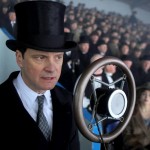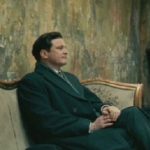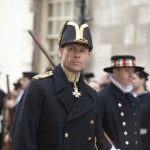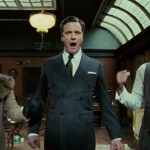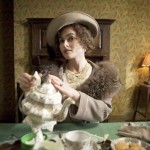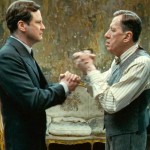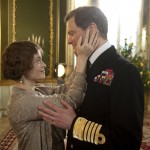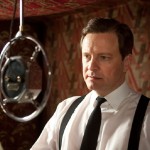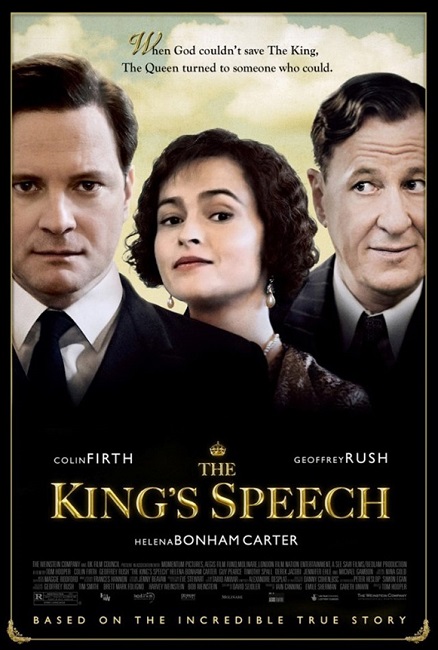
The King’s Speech – 2010
The King’s Speech was a well-made movie that was slow and boring, and there was a very specific reason why. It was a historical drama that revolves around the figure of King George VI of England. Actually he is only the Duke of York for the first half of the film. The problem is that he has a speech impediment. He has a very bad stammer. It takes him several minutes to say a few sentences. We all know how painful it is to try to listen to a person with such a disability. The problem is that the film does not shy away from those painful moments.
What this does is it effectively puts the audience into a situation that is awkward and uncomfortable in the real world. But OK, I get it. That was intentional. But with all the big, slow pauses and uncomfortable silences, we sit there watching and waiting for something to be said. It just helped to make the whole film… well, slow and dull.
The movie starred Colin Firth in the lead role of His Royal Highness, Prince Albert, the Duke of York, later renamed as King George VI. His wife, Queen Elizabeth, formerly Duchess of York, played by Helena Bonham Carter, is a loving and devoted wife. After a disastrous speech closing the British Empire Exhibition at Wembley Stadium, multiple speech therapists are hired to cure the Prince of his affliction, but to no avail. Frustrated, Prince Albert gives up hope of ever being able to speak without his stammer.
In fact, the speech impediment is so bad, he cannot even talk to his daughters without stammering. Everything seems hopeless, but more or less safe. After all, he is not the next in line for the throne and is not likely to give too many public speeches in his life. But ever loving and loyal, the Duchess finds a speech therapist named Lionel Logue, played by Geoffrey Rush. She meets with him and finds that his methods seem to be unconventional which gives her hope for better, if not different results.
The Duke agrees to see him. At their first meeting, Logue waves a magic wand and instantly wipes away the Duke’s stammer. How, you might ask? Well, he turns on a record with a set of headphones so that only the Duke can hear it. He then has him read and record the To Be or Not To Be speech from Hamlet. He reads beautifully and flawlessly without stammering at all, proving that he is capable of unhampered speech. My question is this: If he is giving speeches over the wireless, or the radio, why did they never employ that little trick again?
OK, never-mind that. I know that not all his speeches were for the radio. Sometimes he would have to speak in a public forum. So, continued therapy was necessary. And I understand that the film is about more than just the speaking. It is about the friendship that develops between the Duke and the speech therapist. But they spent too little time exploring that friendship and what it meant to the two men. They spent some time on that, yes. But maybe a little more would have made the film more dramatic.
Then, at one point, I thought it would be about how Logue eventually gets Albert, otherwise known as Bertie, to delve into the psychological reasons for the speech impediment. Now, here there could have been some interesting drama, but again, they dropped the ball. Very little time was devoted to those deep emotional shortcomings and fears that were acquired in the Duke’s early childhood which were the cause of his overwhelming disability. There was a single scene which did a lot of hinting and suggesting, but very little actual hard reasoning. Maybe the filmmakers were trying to remain close to actual events, but Hollywood is no stranger to embellishment for dramatic purposes.
In fact, such artistic license was taken in this very film in regards to the severity of the stammering, itself. True, the real King George VI had a stammer that was strong enough to be called a disability, but the film portrayed it as something so intense that at times, it robbed him of the power of speech altogether. Also, they stretched out the time it took for Bertie’s speaking to improve from the months to years.
But for me, I think that the whole plot line about how his older brother, Edward, Prince of Wales, played very well by Guy Pearce, was far more interesting than Bertie’s “inspired” efforts to overcome his speaking disability. Edward was having an affair with a woman who had been divorced twice.
What I found interesting about that was the fact that the British nobles, the members of Parliament, and the government didn’t care about the affair, nor did they care about the fact that it was with an American woman. They would have approved of the affaire if he had kept it relatively discrete. But to marry her? A woman who had been divorced?!? That was the big scandal. And that was why Prince Edward had to abdicate the throne after the death of King, George V, played by Michael Gambon.
But, of course, the abdication forced Bertie to take the throne, himself. They made a big deal out of 4 simple sentences he had to say at his coronation ceremony. Here again, they could have had a really cool scene, showing the ceremony, the costumes, the pomp, the crowds of people… but they dropped the ball again. Instead of filming the coronation ceremony, they showed Bertie practicing his 4 lines in an empty cathedral, then they skipped ahead to the new Royal Family as they watched a few seconds of old black and white footage, which might have been real footage of the actual coronation event as the King’s face was never shown.
Interesting note: In the real world, when Prince Edward abdicated the throne, he was actually banned from the British Isles. The only times he and his wife Wallis Simpson were ever allowed back into the country was to attend the funerals of his mother and his brother Bertie. The ban was put in place by the Queen Mother, Elizabeth. She hated Wallis and blamed her for forcing Bertie onto the throne before he was prepared, thus contributing to his early death. However, he actually died from lung cancer at age 56.
This, of course, is not the first Best Picture winner for actors Geoffrey Rush or Colin Firth. However, it is Helena Bonham Carter’s first. I mention this because I have always liked her as an actress. She is gorgeous and there is an openness about her that is very appealing. In this role, there is a lovely natural quality about her that has an inner core of strength and poise. She really stood out to me as a good actress. She was nominated for Best Supporting Actress, though she did not win.
Rush also did a good job. Though not much is known about the real Logue, the screenwriter, David Seidler, a man who had overcome a similar speech impediment in his own life, was able to get ahold of Logue’s notebooks. This helped to create a more complete picture of the man who helped King George VI to make the important and inspirational speeches required of a man in his position. Rush was able to fill in the blanks with his own skills as an actor, and though he didn’t win, he was also nominated for Best Supporting Actor.
Interesting note: In the late 1970s and the 1980s, Seidler went to Logue’s grandson, Valentine Logue to ask for an interview and the notebooks. Logue only agreed to discuss his grandfather’s relationship with King George VI and make the notes available if the Queen Mother allowed it. She asked that this not be done in her lifetime. Three years after her death in 2002 the project was picked back up and the notebook was released.
As for Colin Firth, I thought he also did well enough. He is a competent actor, though I generally see him playing the same character over and over again: the stuffy British gentleman. Like Clint Eastwood or Tommy Lee Jones, or even Keanu Reeves, as long as you only cast them in the kind roles roles that they are known for, they will do a very good job. That being said, sometimes I would like to see Firth stretch himself as an actor. However, he won the Oscar for Best Actor for his work in The King’s Speech.
Another actor, who I thought did a good job was Derek Jacobi as the Archbishop Cosmo Lang. We remember him from the 2000 Best Picture winner Gladiator. His character is quite different, but he played it with sufficient gravity and skill. He has a good on-screen presence and a very distinct appearance.
One thing about the film that I liked very much was the music. The Soundtrack was composed by Alexandre Desplat. The music is sparse, specifically reflecting the King’s broken speech. The instrumentation is minimal: nothing more than strings and piano, except for one track which features an oboe and a harp. It is beautiful and simplistic with a feeling of sadness and melancholy. Right at the very beginning of the movie, it caught my attention as something special.
The music lent itself very easily to both the subject matter and visual style of the film. There were very few bright colors. The costumes and filming locations alike were all muted tones of gray, brown and black. As is often the case in England, many outdoor scenes took place in the rain. The cars were all black. The wallpapers on many of the indoor sets were made up of dull and lifeless colors. Even when there were colors, they were muted or dim, like the faded pastel dresses worn by the Duchess or the dark red lipstick worn by Prince Edward’s mistress.
Everything pointed towards depression, frustration and sadness. All except for the final shot before the credits. After King George gives his first good speech on the wireless, the speech that announced to all the people of England that they were now at war with Germany, the King, his Queen, and their two children, Princess Elizabeth and Princess Margaret, walk out onto a balcony to stand and wave before their subjects. There in that one shot, the colors are brightened, despite the dark times that we all know are ahead of them. But that wasn’t the point of the movie. The King had successfully gotten through the hardest and most important speech of his career, all because of his speech therapist and friend, Lionel Logue.
But in the end, this film was much too slow and the subject matter was just too dull for my tastes. Still, many people liked it. In addition to Best Picture, The King’s Speech won Oscars for Best Director (Tom Hooper), Best Original Screenplay (David Seidler) and Best Actor (Firth). I thought it was a passable film, though not nearly as great as everyone made it out to be.
